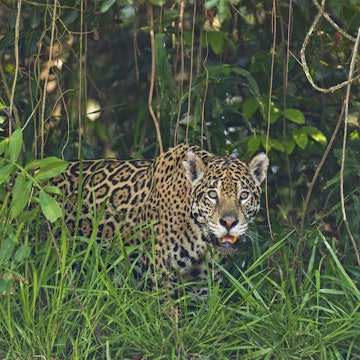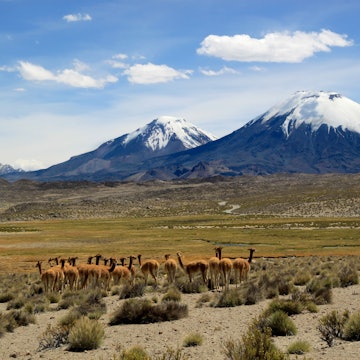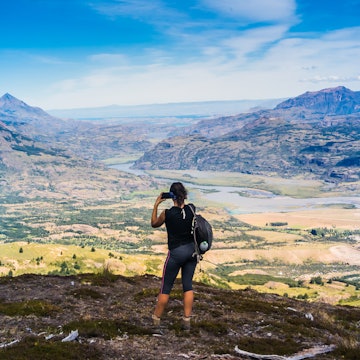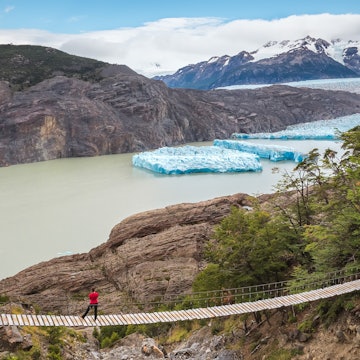

The port town of Ushuaia is Tierra del Fuego's main transport hub. Andrew Peacock / Getty Images
Travel to the terminus of the Andes and you’ve truly reached the end of the world once you set foot on Tierra del Fuego, a mythical land of fire and ice marooned off the southern tip of South America. Split in two by a border, it’s never been easier to visit both the Chilean and Argentinean sides of Tierra del Fuego on an epic journey through forgotten fjords, crackling glaciers, windswept pampa and brooding evergreen forests. Here’s how to make it happen in one perfect week.

Day one
Malvinas Argentinas International Airport in Ushuaia is the main commercial airport on Tierra del Fuego and the easiest place to begin your journey with at least two daily flights from Buenos Aires. This salty port town may seem rough around the edges at first glance, but its highly developed tourism industry welcomes visitors to the edge of the Americas with all the comforts of back home (think Patagonian wine and fire-cooked lamb).

Ushuaia is the base for 90% of the world’s cruises to Antarctica each summer (Nov-Mar) and transforms into a full-fledged winter wonderland come June when skiers, snowmobilers, snowshoers and dog-sledders flock to its powdery hills (like Cerro Castor) and rambling river valleys (like Tierra Major) for epic adventures. Introduce yourself to the storied history of this unlikely outpost with a visit to Museo Maritimo y del Presidio, a museum housed within the cellblocks of the old National Prison.
Day two
The toy-like Tren del Fin de Mundo is an old logging train that originally shuttled prisoners to work camps, but now ushers tourists on a 7km track from town up to the lichen-covered lenga forests and languid peat bogs of Parque Nacional Tierra del Fuego. The tranquil waters of the park’s Lapataia Bay are ideal for a morning canoe trip paddling alongside cormorants, petrels, albatrosses and other Patagonian seabirds.

Return to Ushuaia for more wildlife viewing on an afternoon catamaran ride down the famed Beagle Channel, one of three navigable passages around South America between the Pacific and Atlantic Oceans. The nutrient-rich waters of the channel are home to sea lions, several whale species and a buzzing colony of orange-beaked gentoo penguins on Isla Martillo. Piratour is the only outfit with permission to land on this island.
Day three
If you cross through the glacier-capped Andes that soar above Ushuaia and skirt the edge of powder-blue Lago Fagnano you’ll reach the golden grasses of Tierra del Fuego’s sleepy interior. Tolhuin, on the lake’s edge, makes a fine base for off-roading adventures. It’s also home to Panadería La Unión, a famed pastry shop with empanadas and alfajores (cookie sandwiches) whose walls are covered in photos of its famous visitors (mostly Argentine rock stars and their scantily clad cohorts).
Continue north until you reach the lonely lighthouse of Cabo San Pablo, which overlooks a sandy beach dominated by the rusting carcass of the Desdémona shipwreck. Stop at Garibaldi Cerveza Artesanal to pick up some hop-heavy craft brews on your return to Tolhuin where you can overnight at Hostería Kaikén, the only remaining of five refuges built by the government in the 1960s for early pioneers.
Day four
If you thought Argentinean Tierra del Fuego was rustic, wait until you cross into the Chilean side at Paso Bellavista. Home to less than 7,000 people, this is truly the final frontier of the Americas. To best appreciate its wild and rugged charms visit Karukinka Natural Park, a 300,000-hectare reserve owned by the Wildlife Conservation Society where culpeo foxes, sure-footed guanacos and skittish tuco-tucos roam the windswept steppe. For 360-degree views of the island, follow the 7km Cerro Pietro Grande trail through sub-Antarctic forests to a series of mountaintop lookouts. Karukinka offers a basic guesthouse, as well as six domes and 10 camping sites in the Vicuña sector.
Day five
Continue north from Karukinka until you reach the rocky shores of Bahía Inútil (Useless Bay) and its Parque Pingüino Rey, home to the only colony of king penguins outside of the Sub-Antarctic islands. What started as a group of eight seemingly lost penguins that washed up on the edge of retired kindergarten teacher Cecilia Durán’s estancia in 2010 is now a breeding colony of nearly 100 thanks to her work in creating this private park (where you can watch the waddling creatures from the safety of a viewing blind). Follow the bay westward toward Chilean Tierra del Fuego’s pint sized capital, Porvenir, to catch the afternoon ferry across the Strait of Magellan and overnight in the bustling port city of Punta Arenas, where king crab is a local delicacy.
Day six
An hour south of Punta Arenas you’ll find Fuerte Bulnes, a reconstructed fort that tells the tale of Chile’s first true attempt at colonizing land at this southerly latitude in the 1840s. The fort lies within Parque del Estrecho de Magallanes with a sleek visitor center that offers fascinating insights into both the motivations of the region’s (predominantly Eastern European) settlers and the struggles of the remarkably resilient indigenous inhabitants.
Nearby you’ll find the boarding location for Expedicion Fitz Roy, a small expedition ship that plies the forgotten corners of the Tierra del Fuego archipelago. Much of Chilean Tierra del Fuego is a puzzle of deserted islands and foggy fjords that can only be explored by water. Set sail toward the towering cross atop Cape Froward – the southernmost point of mainland South America – and wake up in Parque Nacional Alberto de Agostini.

Day seven
Spend your final day in Tierra del Fuego searching for whales (humpbacks, orcas, blues, southern rights) and exploring the glaciers that tumble down into the frosty sea from the Cordillera Darwin, the world’s southernmost mountain range outside of Antarctica. With foreboding peaks and dense lenga forests, this isolated landscape can’t look all that different from the days when the indigenous Yaghan slathered their naked bodies in seal oil, wrapped themselves in guanaco fur and paddled the frigid fjords in search of a daily meal. Once you disembark back in civilization (Punta Arenas), you can either fly out via Santiago or return to Ushuaia by bus, car, flight or ferry.
Mark Johanson traveled to Tierra del Fuego with the Adventure Travel Trade Association. Lonely Planet contributors do not accept freebies in exchange for positive coverage.
















